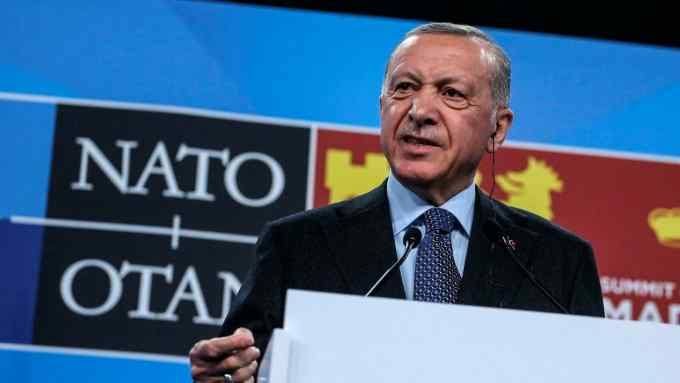Tough Talk of Turkiye fuels Aegean tensions
Turkish president Recep Tayyip Erdoğan did not mince his words as he responded to the latest in a series of tit-for-tat accusations between Turkey and Greece.
Athens, he said in a speech this week, was playing “perilous games” with regional stability, alleging a military build-up on some Greek islands. Turkey, he said, would use “all the means at our disposal, when necessary” to defend its rights.
Relations between the historical foes have reached their worst point in decades in recent months, as Erdoğan has made a series of thinly veiled threats to invade his neighbour and fellow Nato member state.
The tough talk has raised the threat of direct military conflict and caused alarm in Nato at a time the alliance is seeking to present a united front in the wake of Russia’s invasion of Ukraine.
“We have now reached the most vulnerable, unstable environment for bilateral ties since 1996,” said Sinan Ülgen, chair of the Istanbul-based think-tank Edam, referring to the period when Greece and Turkey almost had a direct confrontation over a pair of Greek uninhabited rocky outcrops in the Aegean Sea.
Greece and Turkey have been at odds for decades over a raft of disputes, including maritime boundaries, the delineation of their continental shelves and the status of the divided island of Cyprus.
Tough Talk of Turkiye fuels Aegean tensions
Acrimony has been mounting since Greek prime minister Kyriakos Mitsotakis used a visit to the US in May to effectively lobby against Ankara’s efforts to buy F-16 fighter jets from Washington. Mitsotakis claimed that the Turkish air force was violating Greek air space on a daily basis. That prompted Erdoğan to say he no longer recognised the existence of the Greek prime minister.
In the months since then, Erdoğan has engaged in some of the harshest rhetoric towards Athens ever heard from a Turkish leader, according to analysts. The Turkish president, who is courting nationalist voters in the run-up to challenging elections next year, warned Greece earlier this month that “we could come suddenly one night”. He also said that Aegean islands that were given to Greece by international treaties more than a century ago were being “occupied”.
That language has caused deep alarm in Greece. Athens has repeatedly pressed the EU, UN, and Nato to condemn Erdoğan’s stance, and has sent letters informing its partners of the “unprovoked, and openly threatening” statements made by Erdoğan. This week, the European Commission said the Turkish threats were “unacceptable” and the “EU reiterated its expectation from Turkey to seriously work on de-escalating tension” — a statement that was welcomed by Athens.
Mitsotakis used his speech at the UN general assembly in New York last week to accuse Turkey of “building a comprehensive narrative of false claims in the Aegean” since the mid-1990s and pursuing an “ever more aggressive revisionist agenda” towards Greece. He added: “What is particularly alarming is the growing intensity of the threats.”
Greece granted the US access to several military bases and updated their mutual defence co-operation in 2021. It also signed a defence pact with France the same year, prompting Ankara to accuse Paris of building “a bilateral military alliance against Turkey”.
At the same time, Turkish officials have accused Greece of arming Aegean islands that should, according to international law, be demilitarised.
This week, Turkish state media published images that they said showed the delivery of several dozen US-made vehicles to the islands of Samos and Lesbos. A Greek government source said the accusations “are part of Turkish propaganda which is distorting reality by presenting Greece as the aggressor”.
Turkey also recently accused Athens of using its Russian-made S-300 air defence system to perform a “radar lock” on several of its F-16 fighter jets — a move that one western military official said would be “highly aggressive” if proven, while adding that Ankara had yet to supply any evidence. Greece denied the accusation.
